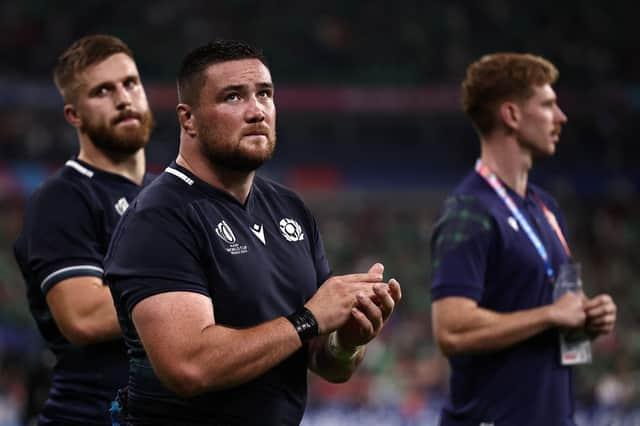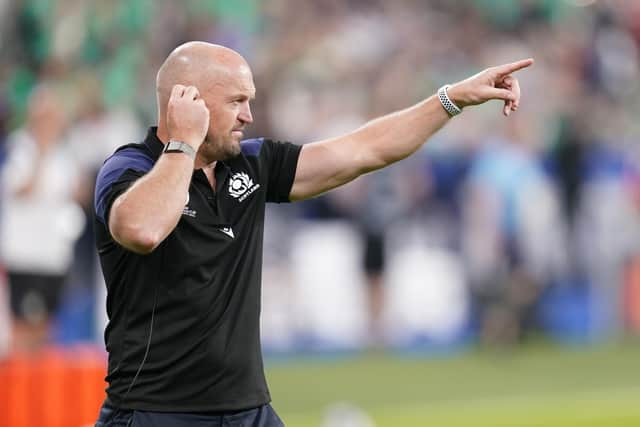Scotland’s Rugby World Cup campaign exposes gulf to big four with real concern for future


While he had been understandably defiant in the immediate aftermath of the 36-14 pummeling by Ireland in Paris, his tone had changed by the time he did his debrief on Sunday “Yes, supporters were right to be disappointed, right to see the scoreline and think, ‘this is not Scotland, this is terrible’,” Townsend said. “We get that.”
In truth, Scotland never looked like winning the game. For all the coach talked up the spell early in the first half when they took the game to Ireland and put together 18 attacking phases, they had already conceded a try by that stage. Given the Scots needed to win by eight clear points, it meant their net deficit was minus 13 with a minute on the clock.
Advertisement
Hide AdAdvertisement
Hide AdIreland, as Ireland do, soaked up the pressure and then delivered a first-half masterclass in taking your chances. They led 26-0 at the break and that was pretty much that. They scored two further tries early in the second period and, with Scotland down to 14 men following Ollie Smith’s yellow card, a record victory seemed on the cards. The Scots rallied and two fine tries from Ewan Ashman and Ali Price added a modicum of respectability to the scoreline. The 6-36 and 10-40 defeats at Murrayfield in 2003 and 2015 respectively remain Scotland’s heaviest against the Irish.


Jason White, the former Scotland captain, called it “a bit embarrassing” but we shouldn’t lose sight of Ireland’s status as the preeminent side in world rugby. A similar result against New Zealand in their prime would be unlikely to attract the same opprobrium. The sense of deflation was palpable, however. Scotland needed a performance that was up there with their best ever and they never came close. Ireland were too good, too shrewd. They had Scotland sussed and have done for a number of years. It’s now nine victories in a row, their longest winning run in the fixture since the war-interrupted streak between 1939 and 1954.
Ireland ripped Scotland’s defence apart in the first 40 minutes. The first two tries were outstanding, pre-planned moves which were executed superbly, and there was no way back. Townsend’s team had entered the tournament in good form and full of confidence. They had won three of their four warm-up games and the only defeat was a last-gasp 30-27 reverse against France in Saint-Etienne which was regularly cited by the coaching staff as their best performance of the summer programme and the template for what they wanted to produce at the World Cup.
Drawn in a group alongside the world’s top two, Scotland were always going to have to beat one of them to progress to the quarter-finals but they failed to show against either South Africa or Ireland. The confident talks seems almost delusional now. Scotland are fifth in the world, the highest they’ve ever been, but the gulf is massive.
And the worry for Scotland is that if you scratch beneath the surface, there is not much there. Townsend has declared himself happy with the core group of 30 to 40 who are vying for the Test team but the lack of young players coming through is a real cause for concern. The under-20s are toiling and it’s why Scotland are reaching out to the likes of Sione Tuipulotu’s little brother, Mosese. If we can’t produce within our own system, then the SRU will continue to scour the globe for Scottish-qualified talent.
So the World Cup moves to the knockout stage with a quarter-final line-up as lopsided as it’s ever been. The top half of the draw is all heavyweight class, with Ireland taking on New Zealand and France hosting South Africa. Both games are in Paris. Down in Marseille, it’s a little more low rent as Wales meet Argentina and England play Fiji.
It is inarguable that Scotland’s World Cup cause was harmed by the fact that the draw was made almost three years ago based on rankings which had the Scots in the third tier of seeds. They were ninth in the world and ended up in Pool B with Ireland and South Africa. By the time the tournament kicked off, all three were in the top five, with Ireland and South Africa ranked first and second, and Scotland fifth.
Townsend expects the draw for the next World Cup to take place closer to the tournament but believes the current competition will suffer from having the top four playing each other in the quarters. “The last draw was based on the rankings after the previous World Cup so I’m pretty sure that’s not going to happen next time,” he said. “Now the top four teams in the world are playing against each other in the quarter-finals which probably isn’t great from a World Cup point of view that two of those teams are not going to be in the semi-finals.”
Advertisement
Hide AdAdvertisement
Hide AdIt’s tempting to think that Scotland would have qualified had they been drawn in Pool C or D but you can only play with the cards you’re dealt and Townsend admitted his squad fell short of standards they had set themselves. The national team will now go into cold storage until the Six Nations, time for the coach to take stock and reflect further.
“We look at ourselves and what we could have done differently,” he said on Sunday. “Could we have mixed up our game more, could we and should we have finished off when we had those possessions? How could we have defended Ireland’s attacks better? It comes down to taking opportunities when you have pressure. We had a lot of possession and territory. You’ve also got to make sure Ireland don’t take their opportunities, and that didn’t happen on Saturday.”
Comments
Want to join the conversation? Please or to comment on this article.
